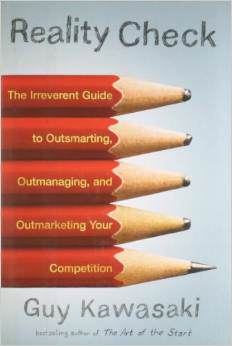Reality Check: Timeless Lessons from Guy Kawasaki
Most of the time, I’m all about providing encouragement and inspiration to entrepreneurs. They need it and they deserve it because entrepreneurs are the lifeblood of our economy. But every so often, I try to give them a reality check, just to keep their feet on the ground and their nose to the grindstone.
Many years ago, I enjoyed one of Guy Kawasaki’s first books, “Reality Check: The Irreverent Guide to Outsmarting, Outmanaging, and Outmarketing Your Competition.” In his classical humorous and cynical style, he could reset your dreaming in a moment. Here are ten themes from the book that I think are just as relevant today as they were then:
- The reality of starting. It’s not going to get better – it already is. Startup folks are like medieval monasteries: always convinced that paradise is just ahead or that things only recently got worse.
- The reality of raising money. The closest real-world analogy to raising money is speed dating. That’s right: In five minutes, people decide if they are interested in you, just as in bars and nightclubs. This isn’t right, and it isn’t fair, but it is reality.
- The reality of planning and executing. If you think raising money was the hard part, you’re in for a surprise. Raising money is easy and fun. The real work begins when you have to deliver the results you promised.
- The reality of innovating. Many people think that innovation is easy: You sit around with your buddies and magical ideas pop into your head. Or your customers tell you what they need. Dream on. Innovation is a hard, messy process with no shortcuts.
- The reality of marketing. Everybody wants to do the fun stuff: shuck and jive with the beautiful people, and create fun marketing campaigns. More accurately, marketing is the process of convincing people that they need your product. That’s not so easy or fun.
- The reality of communicating. Entrepreneurship is an outward-focused activity. It requires that you communicate with others in all the modern modes. Every one is a skill you need to master. All it takes is reading this book and practicing for twenty years.
- The reality of competing. If you don’t compete with anybody for very long, it may mean that you’re trying to serve a market that doesn’t exist. The question of defensibility is one of the toughest for an entrepreneur to answer. A good answer is not to stop moving.
- The reality of hiring and firing. These are black arts for most people. Few people are trained for either, and most depend on their gut. They believe they won’t make hiring mistakes, so will never have to fire anyone. Wrong; and mistakes hurt people and you.
- The reality of working. In the beginning, startups are like a clean sheet of paper: nothing but opportunity and upside with a chance to make meaning and change the world. Then the reality of work sets in. Building a success is hard – damn hard, actually.
- The reality of doing good. At the end of one’s life, you are measured not by how much money you made, but by how much you’ve made the world a better place. Successful entrepreneurs often switch to non-profits and social entrepreneurship for real impact.
Of course, there is much more, but I think you get the idea. I also hope these themes don’t send a totally negative message because the book is funny as well as thought-provoking. I do believe we all need reality checks to face our challenges head-on, so that we can deal with them and survive, rather than just float along in the clouds until our dreams evaporate.

